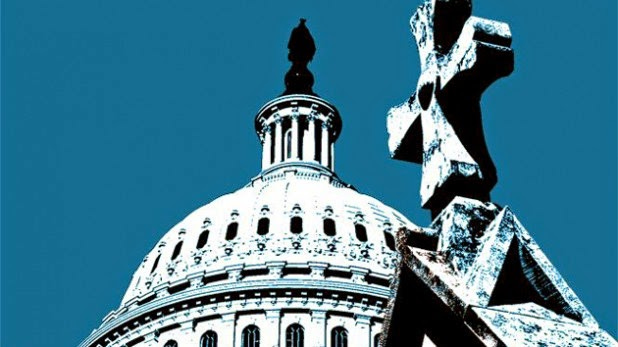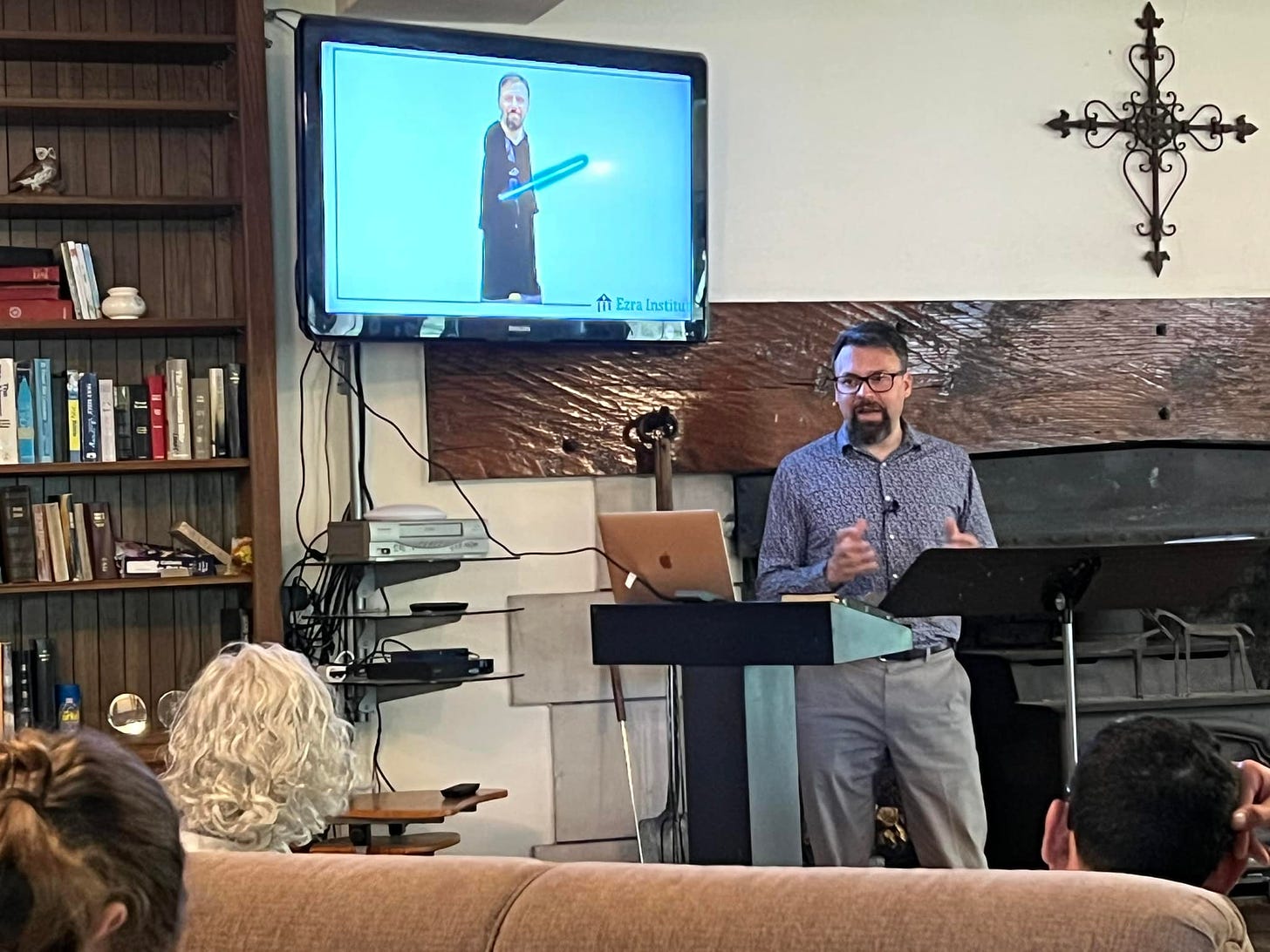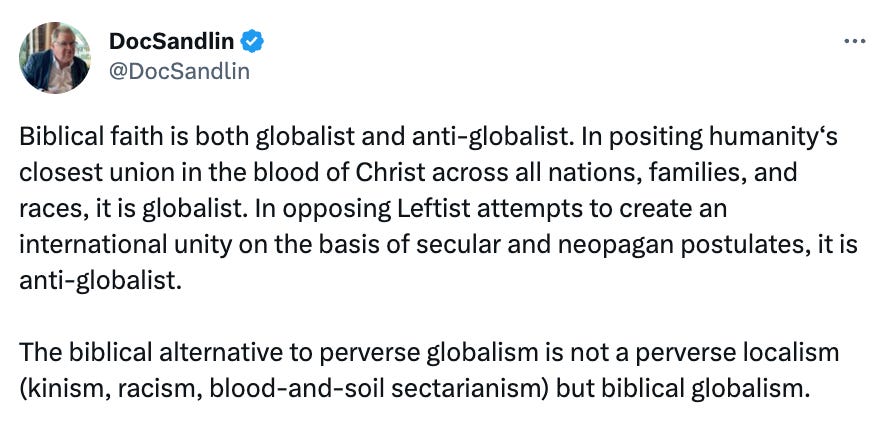Excerpted from a talk at the spring Common Slaves conference, Crosby, Minnesota.
Dear friends and supporters:
This week I’ll focus briefly on one of the most prominent and poisonous errors afflicting conservative Christianity. I’m not taking about liberalism. I’m talking about professed conservative, evangelical Christianity. That error is Privatized Christianity.
These days when we hear the word privatized, we usually think about the free market. We talk about privatizing the airlines and privatizing Amtrak and privatizing education. We could use more of this version of privatizing. The government is way too big. But that’s not what I mean. By private or privatizing, I mean limiting the Faith to the family or at most the church. And, most of the time, private means what’s between somebody’s two ears. I mean it’s not public. It’s not expressed out where everyone can see it. It’s not in education. It’s not in politics, it’s not in art, it’s not in Hollywood. It’s not in popular culture. Then, it would be public. If it’s only in our families and churches and brain, it’s private.
This distinction into public and private is a distinctly modern development. In most of the ancient world, the social order was the political order. Big government didn’t start with 20th century liberals. Big government was all over the ancient world. It was the political community that held all of society together. Politics governed everything else.
Christianity broke that pagan political unity. All of life is to be governed by Jesus Christ and the Bible, not politics and “natural” ( = darkened, sinful) reason.
In the medieval world, Christianity pervaded all of life, though that world wasn’t consistently Christian (for one thing, it created two authorities for the church, Bible and tradition, and “natural” reason outside the church). The church was the center of life, but the kings and other political rulers were subject to the church. There was a constant battle for dominance between the two: would the church or would the state rule society? Christianity wasn’t a private affair, while secularism was a public affair. There was no secularism. That division came later.
Christianity Public in Scope and Application
The first thing to understand is that Christianity is public in scope. Our Founder’s ministry was public. Jesus Christ’s first adult act of ministry was to read and declare the Old Testament in the synagogue, publicly, where he’d been reared as a child. He then taught everywhere: out in the field, on hills, at the seaside, in a boat, and to large groups gathered in various homes.
He taught his disciples privately, but then commissioned them to minister publicly. Almost all of his kingdom in-breaking healings and exorcisms were public acts. The apostate Jews opposed Jesus precisely because his ministry was not private; he was declaring his Father’s will publicly, and they hated him for that. Jesus wouldn’t have been a threat to their authority had he kept his ministry private.
At Athens Paul declared the gospel in the marketplace, in the synagogue, and at the Areopagus (Acts 17:16–21). Peter and Paul and the other apostles were constantly declaring the word publicly, and they were punished and jailed for doing this. They were accused of turning the world upside down (Ac. 17:6). That’s an odd charge to level at religious people whose faith is purely private.
Application
Christianity is public not just in scope but also in application. The Faith is designed not just for the entire world, but for every aspect of the world. The apostle Paul tells us that God has placed all things under the feet of Jesus Christ (Eph. 1:22). By all things, he means all things: not just the family and church, but, in the contemporary world, hospitals and museums and universities and biological research labs and car dealerships and music studios and everything else.
Public Gospel
The gospel itself is a public message. The good news is that God in Jesus Christ his Son is gradually purging sin from the world. That’s why he died and rose again. He’s restoring and enhancing the glory of Eden. The gospel isn’t a message of escape. It’s not a private fire insurance policy. The gospel is about what God is doing in history.
God’s at work in the world, not first in our heart, and he’s at work in our heart only because he’s at work in the world. The gospel is God’s plan for his world, not simply for the human heart. The gospel is historical, and it’s public.
No Uncontested Ground
The early Christians weren’t martyred because they trusted Jesus in their hearts. The ancient Romans were polytheists, and as their empire expanded, they collected gods like philatelists collect stamps. They couldn’t care less if people trusted Jesus. But to declare that Jesus is Lord (the first creed of the church, by the way) and therefore that Cesar is not the ultimate Lord — was considered seditious. Either Caesar is lord or Jesus is Lord.
Christians bowed the knee only to Jesus. That’s why they were persecuted. They were not political revolutionaries. They obeyed the civil rulers. But they didn’t recognize civil authority as ultimate. Christ’s authority is ultimate. And when the civil government required what God’s word prohibited (worshiping Caesar) or prohibited what God’s word required (preaching the gospel), they obeyed God and his word.
This public Christianity set our forebears on a collision course with the ancient pagan Roman Empire. Jesus is Lord not just of the human heart, but also in all areas of life. The power-hungry Caesars couldn’t, of course, abide such a sovereign competitor. And that’s why Christians had to go. They contested all areas of life, public and private. If Jesus isn’t Lord everywhere, he’ll eventually not be Lord anywhere.
Christianity is an inherently public faith.
Conclusion
To privatize Christianity is to destabilize, dilute, and eventually destroy it. It’s not merely the case that when Christianity is privatized, its effectiveness is blunted. Rather, it becomes something different from Christianity.
Imagine a wealthy sports owner who wanted to start a new baseball league, but to play the game without bases. You’d say, “You can create a new game if you want, but just don’t call the baseball.” Similarly, a privatized religion that stresses Jesus Christ’s death and resurrection but limits them and their effects to the private realm is not normative Christianity. It’s a diluted and deformed version.
Eventually it will become none at all.
Will you consider a tax-deductible donation to CCL via PayPal or Venmo? Or mail a check to CCL, Box 100, Coulterville, CA 95311. God uses you to keep us going — and expanding.
Personal
I just returned from Minnesota, addressing first the spring Common Slaves conference (Pastor Eric Anderson), then preaching in morning worship at Lifespring Church, and finally lecturing at Ezra Institute’s Christianity and Culture Colloquium (Dr. Joseph Boot). All three were well-attended and mightily blessed by God.
The latter venue (as you can see) was exceptional. Many thanks to Dr. Ardel Caneday for the photo.
Dr. Joseph Boot, God’s worldview apolojedi, kicked off the Minnesota Christianity and Culture Colloquium with an absorbing definition and explanation of Christian worldview. Joe is one of the great worldview thinkers in the church today.
A long-form essay should appear here at CultureChange soon. Meanwhile, why not share this present essay?
Thanks deeply for your prayer and support.
Yours for public Christianity,
Founder & President, Center for Cultural Leadership
Tweet of the Week
Coming Soon From CCL:
More great stuff:
The Center for Cultural Leadership site is here.
My Amazon author page (print and digital) is here.
My I-Tunes sermons, lectures and podcasts are here.
You can find my sermons and lectures at my YouTube channel.
Sign up to get my blog updates here.
Here’s my Twitter feed.
If you want to get the free exclusive hard copy publication Christian Culture, please send me a Facebook private message.
The CCL phone number is 831-420-7230.
The mailing address is:
Center for Cultural Leadership
P. O. Box 100
Coulterville, CA 95311










Thank you, dear brother Andrew, for this wonderful clarity in this terribly mirky mordrrn world. Long live public Christianity. Forsooth.
Specifically how is Christianity not very public in American society today? You seem to conflate the ideas of keeping your faith secret with not legislating it. Are you thinking in theonomic terms, in this article?
I see Christianity everywhere I look, these days (at least in America); not very many people are private about their faith.